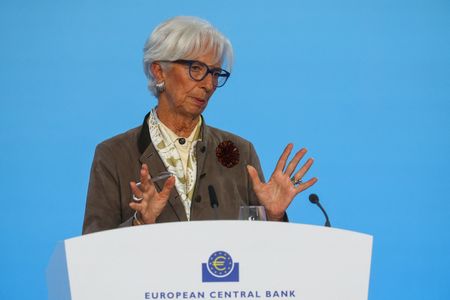By Francesco Canepa and Balazs Koranyi
FRANKFURT (Reuters) -European Central Bank President Christine Lagarde signalled no rush on Thursday to intervene in the bond market to support France, which has become engulfed in a political and budget crisis.
France’s political instability and its failure to tackle ballooning public debt have unnerved investors, who have been demanding a growing premium to lend to the French government in the bond market.
The ECB has the power to step in and buy government bonds to stem an “unwarranted, disorderly” rise in borrowing costs under its Transmission Protection Instrument, as long as a country complies with the European Union’s budget rules.
LAGARDE SAYS RESPECT EU BUDGET RULES
Lagarde appeared to play down the prospect of an intervention, saying the euro zone bond market was still functioning well and all countries needed to respect the EU fiscal framework.
“Euro area sovereign bonds are orderly and are functioning smoothly with good liquidity,” Lagarde, a former French finance minister, told reporters after the ECB decided to keep rates steady.
French Prime Minister Francois Bayrou’s government fell earlier this week after he failed to secure parliamentary support for his plans to reduce the budget deficit, which last year was nearly double the EU’s 3% of GDP limit.
France is the EU’s second-largest economy. Its budgetary and political crisis threatens to weaken the bloc, politically and economically, just as it tries to navigate U.S. trade tariffs.
Stressing she was talking about the euro zone as a whole and not just France, Lagarde said that the ECB needed “a well-functioning” bond market to control inflation.
But she added governments must stick to EU rules.
“There is also a set of rules… and the member states have to adhere to it,” she said. “I’m sure that all governments, wherever located, will want to operate on the basis of that fiscal framework.”
INVESTORS DEMAND SIMILAR PREMIUM FROM FRANCE AND ITALY
France’s public debt has climbed to 113.9% of gross domestic product, in part due to successive governments’ largesse during the COVID-19 and cost-of-living crises.
Investors are now demanding a similar premium – as measured by the spread over Germany’s 10-year bond yields – from France as from Italy at around 80 basis points. [GVD/EUR]
Bayrou has been replaced by Sebastien Lecornu, a loyalist of President Emmanuel Macron and his fifth prime minister in less than two years.
“I’m confident that the policymakers… will take it to heart in that period of uncertainty to reduce uncertainty as much as possible,” Lagarde said.
A debt crisis centred around Greece nearly brought down the euro in the 2010s before then ECB President Mario Draghi pledged to do “whatever it takes” to preserve the single currency – an implicit reference to buying bonds.
ECB board member Isabel Schnabel told Reuters last week that France needed to consolidate its finances and foster potential growth but she did not see these issues as having wider implications for the euro.
(Reporting By Francesco Canepa; Editing by Emelia Sithole-Matarise)











